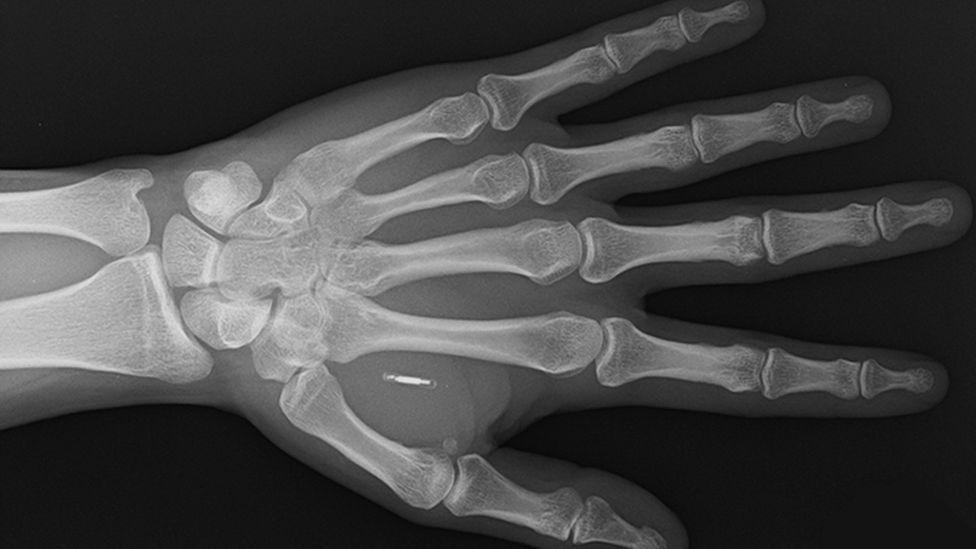Africa-Press – Cape verde. Patrick Paumen causes a stir whenever he pays for something in a shop or restaurant.
This is because the 37-year-old doesn’t need to use a bank card or his mobile phone to pay. Instead, he simply places his left hand near the contactless card reader, and the payment goes through.
“The reactions I get from cashiers are priceless!” says Mr Paumen, a security guard from the Netherlands.
He is able to pay using his hand because back in 2019 he had a contactless payment microchip injected under his skin.
“The procedure hurts as much as when someone pinches your skin,” says Mr Paumen.
A microchip was first implanted into a human back in 1998, but it is only during the past decade that the technology has been available commercially.
And when it comes to implantable payment chips, British-Polish firm, Walletmor, says that last year it became the first company to offer them for sale.
“The implant can be used to pay for a drink on the beach in Rio, a coffee in New York, a haircut in Paris – or at your local grocery store,” says founder and chief executive Wojtek Paprota. “It can be used wherever contactless payments are accepted.”
Walletmor’s chip, which weighs less than a gram and is little bigger than a grain of rice, is comprised of a tiny microchip and an antenna encased in a biopolymer – a naturally sourced material, similar to plastic.
Mr Paprota adds that it is entirely safe, has regulatory approval, works immediately after being implanted, and will stay firmly in place. It also does not require a battery, or other power source. The firm says it has now sold more than 500 of the chips.
The technology Walletmor uses is near-field communication or NFC, the contactless payment system in smartphones. Other payment implants are based on radio-frequency identification (RFID), which is the similar technology typically found in physical contactless debit and credit cards.
For many of us, the idea of having such a chip implanted in our body is an appalling one, but a 2021 survey of more than 4,000 people across the UK and the European Union found that 51% would consider it.
However, without giving a percentage figure, the report added that “invasiveness and security issues remained a major concern” for respondents.
Mr Paumen says he doesn’t have any of these worries.
“Chip implants contain the same kind of technology that people use on a daily basis,” he says, “From key fobs to unlock doors, public transit cards like the London Oyster card, or bank cards with contactless payment function.
“The reading distance is limited by the small antenna coil inside the implant. The implant needs to be within the electromagnetic field of a compatible RFID [or NFC] reader. Only when there is a magnetic coupling between the reader and the transponder can the implant can be read.”
He adds that he is not concerned that his whereabouts could be tracked.
“RFID chips are used in pets to identify them when they’re lost,” he says. “But it’s not possible to locate them using an RFID chip implant – the missing pet needs to be found physically. Then the entire body gets scanned until the RFID chip implant is found and read.”
Yet the issue with such chips, (and what causes concern), is whether in the future they become ever more advanced, and packed full of a person’s private data. And, in turn, whether this information is secure, and if a person could indeed be tracked.
Financial technology or fintech, expert Theodora Lau, is co-author of the book Beyond Good: How Technology Is Leading A Business Driven Revolution.
She says that implanted payment chips are just “an extension of the internet of things”. By that she means another new way of connecting and exchanging data.
Yet, while she says that many people are open to the idea – as it would make paying for things quicker and easier – the benefit must be weighed up with the risks. Especially as and when embedded chips carry more of our personal information.
“How much are we willing to pay, for the sake of convenience?” she says. “Where do we draw the line when it comes to privacy and security? Who will be protecting the critical infrastructure, and the humans that are part of it?”
Nada Kakabadse, professor of policy, governance and ethics at Reading University’s Henley Business School, is also cautious about the future of more advanced embedded chips.
“There is a dark side to the technology that has a potential for abuse,” she says. “To those with no love of individual freedom, it opens up seductive new vistas for control, manipulation and oppression.
“And who owns the data? Who has access to the data? And, is it ethical to chip people like we do pets?”
The result, she cautions, could be “the disempowerment of many for the benefits of a few”.
Steven Northam, senior lecturer in innovation and entrepreneurship at the University of Winchester, says that the concerns are unwarranted. In addition to his academic work he is the founder of UK firm BioTeq, which has been making implanted, contactless chips since 2017.
Its implants are aimed at people with disabilities who can use the chips to automatically open doors.
“We have daily enquiries,” he says, “And have carried out over 500 implants in the UK – but Covid caused some reduction in this.”
“This technology has been used in animals for years,” he argues. “They are very small, inert objects. There are no risks.”
Back in the Netherlands, Mr Paumen describes himself as a “biohacker” – someone who puts pieces of technology into his body to try to improve his performance. He has 32 implants in total, including chips to open doors and imbedded magnets.
“Technology keeps evolving, so I keep collecting more,” he says. “My implants augment my body. I wouldn’t want to live without them,” he says.
“There will always be people who don’t want to modify their body. We should respect that – and they should respect us as biohackers.”
For More News And Analysis About Cape verde Follow Africa-Press







I never use it …… Never the bible state any one that takes human chip mark of the beast rev 13 the mark is made from the lab .an it tiny chip that I won’t receive one Neve never the lord is coming soon our bank cards use it shops goods plastic in cars bus train ship radio TV cell phones I say no to the chip I don’t want to sell my soul to the pit of hell where u be tormented day an nite the wrath of God will be pour out to all those who reseave the chip I’m spiritualy fill by the holy spirit not by some satan anty Christ the bible speaks very very clear on marking on Ur body no graven images tatoes see if God wanted to put man made chip in Ur body we would of had one when we born so I won’t take it it nit for me my medical doctor told me no an u cant froce me I just say no thank u .I’m born again save by the lord not by sone chip .
So do not send this mail to this cell leave south Africa alone an remove Ur evil chip out of south Africa we don’t need this we are very strong in our money ….we must use money bank card s still not meny want chips we have our grand children to teach about money notes coins so we want our children child ren to learn how to Handel money chip remove the beauty how to spend our money in not in favour of the implant chip when the new south Africa don’t alow to use it meny community will refuse I hope they do so we feel in south Africa say no not for us so never ever send mail or email ever again we can have u traced an get sued so stay off all our mobile for good take a warning
The chip is very dangerous it had tiny battery that can bust it has assid an that can bring cancer to any humans it has a tracker which I have read in books track every move u make how do I think when Ur dog lost that can be found baby stolen can f
The chip is very dangerous it had tiny battery that can bust it has assid an that can bring cancer to any humans it has a tracker which I have read in books track every move u make how do I think u can cars children v
Once u been chip u cant remove it so let think of our soul going to hell .
Let’s think what the lord done for us
Jesus died on the cross he was nail he bled an died for our sins how can we smack God in the. Face we must realise what we do if we take this chip u go stright to hell there’s no truning back .so think before we get inject with this evil disgust what has happened to our human rasis have we fir gotten what God can do who created us the RFID Microsoft chip who give us strength who wake us up out of bed not the RFID chip no God dose amen